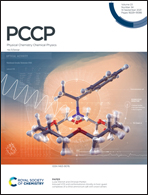Competition and conversion between pnicogen bonds and hydrogen bonds involving prototype organophosphorus compounds†
Abstract
Ab initio calculations have been performed to investigate the competition and conversion between the pnicogen bonds and hydrogen bonds in complexes containing prototype organophosphorus compounds RPO2 (R = CH3 and CH3O). The competition between the pnicogen bonds and hydrogen bonds is controlled by the magnitude of Vs,min and Vs,max in the prototype organophosphorus compounds. Monomeric methyl metaphosphate (CH3OPO2), with more positive π-holes, is more likely to form pnicogen bonds with different electron donors, such as NH3, H2O, HNC and HCCH. Methoxyphosphinidene oxide (trans- and cis-CH3OPO) is inclined to form hydrogen bonds with H2O, HNC and HCCH. Most of the pnicogen bonds have covalent or partially covalent character, while most of the hydrogen bonds exhibit the noncovalent characteristics of weak interactions. The mechanisms of three typical conversions between the pnicogen bond and the hydrogen bond have been investigated and the breakage and formation of the bonds along the reaction pathways have been analyzed using topological analysis of electron density. For the three studied conversion processes, the transformation between the hydrogen-bonded complex and pnicogen-bonded complex is achieved readily through several T-shape structure transition states.



 Please wait while we load your content...
Please wait while we load your content...